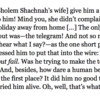8: Excerpt from Sholem Aleichem’s “On Account of a Hat” (1913), translated into English by Isaac Rosenfeld (1953).
Early in the story, when he makes a little money, Sholem Shachnah sends his wife a telegram. In that message, he informs her that he plans to get home in time for Passover “without fail”: like the whole text of the telegram, the word in question is in Russian (the language of the wire service), bespremenno, and it communicates Sholem Shachnah’s fatefully confident reliance on the steady workings of Russia’s imperial railways. It is this single Russian word—which becomes a two-word phrase in Isaac Rosenfeld’s translation—that is said to cause the anger of Sholem Shachnah’s wife. It’s worthwhile to consider a range of possible reasons.
Suggested Activity: Consider both the text of Sholem Shachnah’s telegram and the journey that this message makes from an unnamed city, where Sholem Shachnah makes a little money, to his home shtetl of Kasrilevka, located a considerable distance away. Sholem Shachnah is a man, moving through a world of men with whom he tries to strike real estate deals and among whom he must navigate his journey home; his spouse, however, is a woman at home, in provincial Kasrilevka, looking after the couple’s children. First, consider the issue of gender and how the worlds of men, on the one hand, and of women and children, on the other, determine the opportunities (and lack thereof) for movement—including, as in Sholem Shachnah’s case, the movement out of the shtetl and into the world beyond. How has Sholem Shachnah’s world begun to change because of his mobility compared to his wife’s? Second, why do you think Sholem Shachnah’s wife gets upset at the language of certainty in which Sholem Shachnah communicates his travel plans? In what ways does the story define Sholem Shachnah as a transgressor against Jewish customs and his wife as the upholder of a traditional lifestyle and set of mores?
Source: Sholem Aleichem, “On Account of a Hat,” trans. Isaac Rosenfeld in A Treasury of Yiddish Stories, eds. Irving Howe and Eliezer Greenberg (New York: Penguin, 1990), 117.
resource_8.png
 Download image (128.15 KB)
Download image (128.15 KB)

